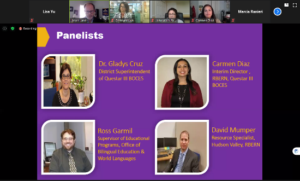Reflecting on UAlbany’s English Language Learner-focused Community Conversations
By Lisa Yu and Kristen C. Wilcox
While English language learners (ELLs), like their native English-speaking peers, have been receiving remote instruction for several months due to the COVID-19 pandemic, the effects on ELL academic learning and social and emotional development are in many ways quite different.
What do district and school leaders, teachers, and parents need to know to help ELL children keep pace academically and stay healthy in mind and body as the effects of the pandemic continue?

In this week’s Community Conversation held by School of Education at UAlbany, a group of experts in ELL education explored some of the challenges facing ELLs and offered recommendations and strategies. The panel included
- Carmen Diaz, Interim Director of Capital RBERN,
- Dr. Gladys Cruz, District Superintendent of Questar III BOCES,
- Ross Garmil, Supervisor of Educational Programs, Office of Bilingual Education and World Languages, and
- David Mumper, Resource Specialist of Hudson Valley RBERN.
As NYKids researchers have studied promising practices for ELLs and shared blogs on supporting ELLs during and after the pandemic, we listened in on this discussion and share out our top take-aways and related research.
#1 Take-away: Face Challenges Through Culturally-Responsive and Asset-based Strategies

To overcome challenges for ELL youth, the panel called for leaders and teachers to rethink ways they develop their relationships with ELLs and ELLs’ parents and family members.
Dr. Cruz highlighted the importance of supporting ELL students’ social-emotional well-being and recommended educators focus on building personal relationships with ELLs and their families and collect information about their ELLs’ prior experiences and backgrounds rather than solely focusing on academic performance.
The panel also recommended that teachers guide their ELLs to reflect on challenging experiences and help them to learn to advocate for themselves.
These suggestions echo recent studies including those by NYKids regarding the need to use culturally-responsive and asset-based strategies with ELLs and their families.
#2 Take-away: Connect All Stakeholders and Leverage All Resources
Galvanizing multiple stakeholders to surmount challenges to ELLs’ opportunities to learn is more crucial than ever. To this point, the panel encouraged districts and school leaders to unite stakeholders and specialists including university researchers and community organizations in developing and providing services.

On this point, Ms. Diaz, in a previous interview with NYKids shared examples of collaborations between education organizations such as RBERN and local digital media companies (e.g. PBS Channel) for program and technology resources and support.
In another recent NYKids blog, we reported on research indicating that it can be challenging for many immigrant parents to engage in their children’s school activities, as they may not be familiar with U.S. school policies and practices. Mumper described a number of bilingual resources and courses on U.S. school policies and practices that were provided to ELL parents over the summer.
For more research and information on this topic see NYKids’ News and Resources pages. We welcome your feedback and suggestions at nykids@albany.edu.
